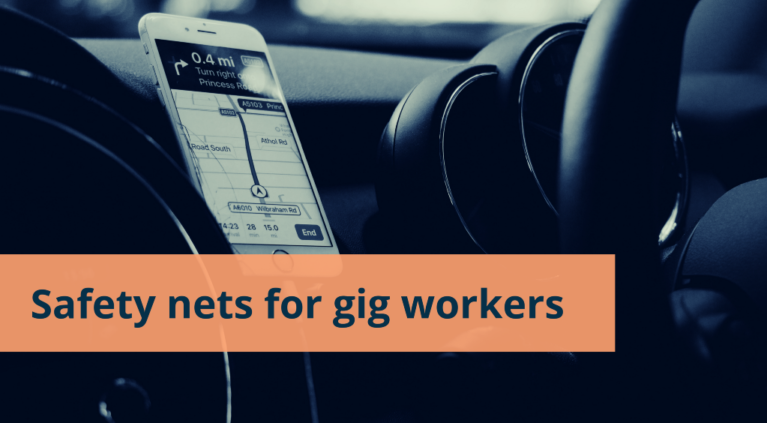Doppelgängers and disco balls: Better Work at TechFestival 2019
Since March this year, we’ve been speaking to gig economy workers – from Uber drivers in Stoke-on-Trent to hired cleaners in London – to explore opportunities to improve their financial resilience and create new training pathways towards better work.
Senior Researcher, Jacob Ohrvik-Stott, premiered these workers’ stories at 2019’s TechFestival in Copenhagen.
The first (and probably only) time I will present research in a room with a disco ball 👇🕺

The discussions centred around the following four main findings emerging from the research:
1. Take-home wages don’t live up to the platforms’ promises
The hidden costs of gig economy work add up. Workers must fork out for overheads such as insurance, gear and food. Then there’s unavoidable unpaid hours spent PR-ing profiles or waiting around for the next gig to come through.
Then competition for and between workers puts further downwards pressure on pay. One commonly cited move from the platform playbook is to lure people over from rivals with superior wages, then reduce them once they reach a critical mass of workers.
“In the beginning they paid £10 per hour to get all the riders to quit their jobs…Then when they’ve got you hooked on they drop it right down to £3/delivery” – Cycle courier, London
One cleaner described how rivals on the marketplace would throw in freebies such as cleaning the fridge in an effort to secure a valuable repeat customers. All of these factors mean workers end up taking home a lot less than the enticing wage advertised on the poster.
2. Workers face big risks from financial shocks
Many workers in the gig economy are struggling to save enough money to cope with unexpected big payments. Some of these shocks are no different to those experienced by the average person, from broken washing machines to runaway phone-bills.
Others costs are bound up in the gig work. An Uber driver in Stoke-on-Trent lived in fear of his aging car breaking down, others described the perils of unexpected quiet weeks on the platforms. Understandably, they bemoaned having to turn to credit cards or tutting relatives in these situations. But they often lack the money, time and headspace needed to plan ahead for them.
3. Most workers have aspirations, but no roadmap to realise them
The career ambitions of those we spoke to were generally expressed in broad and generalised terms. Although people wanted to be “as rich as Flloyd Mayweather”, run their own businesses or be comfortable enough to visit their home country twice a year, few had a clear idea of what their next step would be.
4. Workers want to progress within gig work
The people we spoke to tended to fall into one of two camps: they were using gig work to seek safe harbour from stressful careers, or they saw it as a temporary stop-gap on the road to more stable and secure future employment.
Both of these groups were united in their desire to get better at the gig – cycle couriering, cleaning or assembling furniture – even when they saw it as just a means to an end. Some workers look at this pragmatically, simply wanting to get better to improve ratings or become more efficient at their gigs to earn more per hour. For many this is also a matter of principle and self-respect.
“I think whatever you are doing, you should be proud of it” – Driver, Stoke-on-Trent
Sharing research in a different cultural context
I wasn’t sure how the findings of our UK-focused on the gig economy debate resonate with the international perspectives in the room. But attendees were engaged we had an enlivened debate. We reflected on solutions to these four challenges and sketched out possible prototype solutions including gig worker co-operatives to support those in financial difficulty and loyalty-based training schemes to empower people to get better at their gigs. We even had an impassioned and impromptu plea for the UK to follow the Scandanavian model by championing worker rights through unionisation and policy change.
It was certainly interesting hearing a different cultural perspective on the research and something we’re don’t usually have the privilege of getting.
On a more personal level, the festival took on a slightly surreal quality: I had never been anywhere with such a high density of heavily-bearded white men (a function of both tech sector demographics and the trendy Meatpacking district location, I suspect); at points it felt like I was walking amongst various iterations of my future self. There were so many doppelgängers present that I was twice mistaken for someone else.
What’s next?
Over the next two months we will be building on these insights and conversations to develop new social safety nets for workers stuck in precarious and gig work. Make sure you’re signed up to our mailing list and follow us on Twitter to stay up-to-date with our progress.

